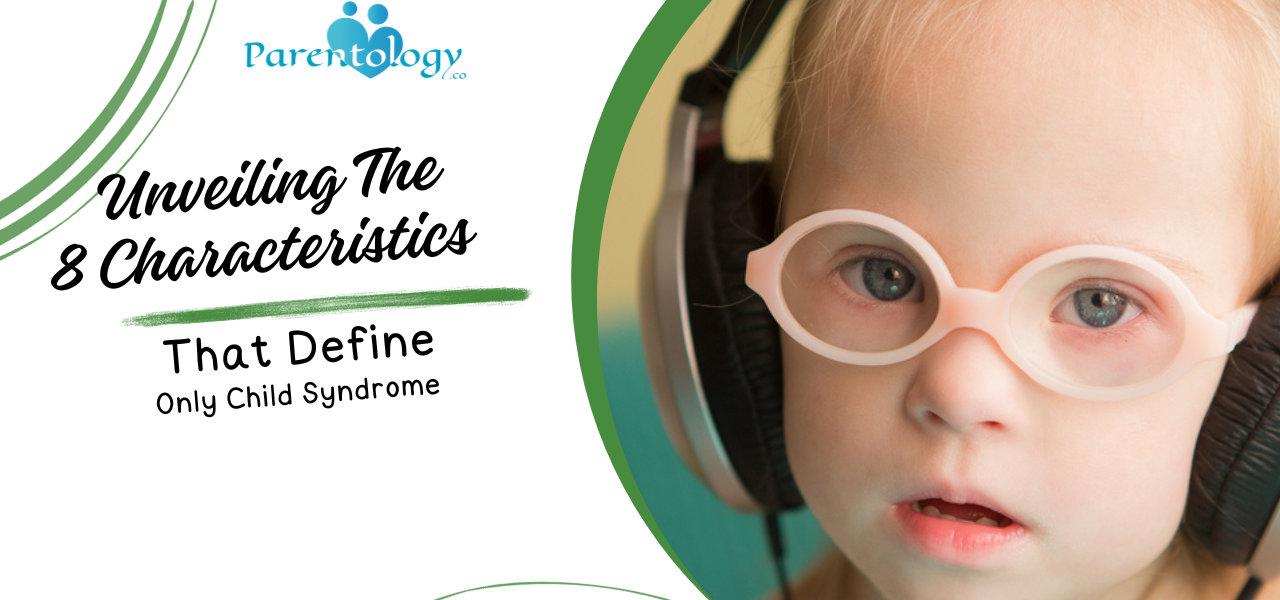Unveiling the 8 Characteristics That Define Only Child Syndrome
Embracing the uniqueness of family dynamics, the phenomenon of “Only Child Syndrome” has garnered attention, sparking curiosity and debate. This comprehensive guide unravels the distinct traits that delineate this syndrome, shedding light on the intricacies of growing up as an only child.
What is Only Child Syndrome?
Only Child Syndrome, often discussed in psychological circles, pertains to the distinctive set of behavioral patterns, social tendencies, and traits observed in individuals who grow up without siblings. While opinions on its existence vary, proponents argue that being an only child can mold certain characteristics that differ from those of children with siblings.
8 Characteristics That Define Only Child Syndrome
-
Self-Reliance:
Only children often develop a strong sense of independence due to the absence of siblings. They learn to entertain themselves and rely on their own abilities for amusement, fostering a self-sufficient nature. This independence can lead to creative thinking and problem-solving skills, as they navigate through solitary activities and imaginative play without the need for constant interaction.
-
Strong Bond with Parents:
Being the sole focus of parental attention allows only children to develop close and intimate relationships with their parents. This bond is characterized by deep trust, open communication, and a strong emotional connection. The undivided attention from parents can create a nurturing environment where children feel understood and supported in their endeavors.
-
High Achievement Orientation:
Growing up without siblings often instills a drive for success and accomplishment in only children. They tend to set high standards for themselves and strive to excel in various aspects of life. This ambition and determination stem from the encouragement and support received from parents who dedicate their attention to nurturing their child’s talents and aspirations.
-
Preference for Solitude:
While sociable, only children also value solitude. They find comfort and peace in moments of solitude, allowing them to recharge and reflect on their thoughts. This inclination towards alone time provides opportunities for introspection and personal growth, fostering a deeper understanding of oneself.
-
Mature Communication Skills:
Interacting more frequently with adults, only children often develop advanced communication skills. They possess the ability to articulate thoughts, emotions, and ideas effectively, as they engage in meaningful conversations with parents, relatives, and other adults from an early age.


-
Need for Approval:
Having primarily interacted with adults during childhood, only children may seek approval and validation from authority figures. They tend to value feedback and recognition, striving for affirmation and acknowledgment of their efforts and achievements.
-
Difficulty Sharing and Compromising:
Without the experience of sharing space or belongings with siblings, only children might face challenges in sharing and compromising with others. This can stem from a lack of exposure to negotiating and cooperating with peers during formative years.
-
Introspective Nature:
Growing up without siblings often leads to an introspective nature. Only children tend to analyze situations deeply, seeking to understand themselves and the world around them. This introspection fosters self-awareness and a quest for personal understanding and growth.
Unique Challenges and Advantages of Only Child Syndrome
Challenges:
- Social Adaptation: Only children may encounter challenges in adapting to social situations, especially in group settings, due to less exposure to peer interactions within a familial context.
- Pressure of Expectations: With undivided attention from parents, there might be heightened expectations for academic performance or behavior, leading to pressure on the child.
- Limited Conflict Resolution Skills: Not having experienced sibling conflicts, only children might face difficulties in managing conflicts or compromises in relationships.
Advantages:
- Close-Knit Family Dynamics: The closeness between only children and their parents often creates a tight-knit family unit, fostering strong emotional support and understanding.
- Opportunities for Personal Growth: The absence of sibling rivalry can provide more opportunities for self-discovery, personal growth, and pursuing individual interests.
- Focused Parental Guidance: Parents can offer focused attention, enabling tailored guidance, education, and the opportunity to explore diverse interests.
Nurturing Healthy Development in Only Children
Parental Involvement:
- Encouraging social interactions beyond the family circle to build strong peer relationships.
- Fostering teamwork and cooperative play to instill sharing and collaborative skills.
- Offering exposure to diverse environments, clubs, or activities to enhance social skills.


Education and Support:
- Emphasizing the importance of empathy, understanding, and conflict resolution in relationships.
- Balancing praise and feedback to promote a healthy sense of self-esteem and independence.
Myth Debunking: Dispelling Misconceptions about Only Child Syndrome
- Spoiled or Selfish Stereotype: Contrary to the stereotype, being an only child doesn’t automatically equate to being spoiled or selfish. Personality traits depend on various factors, not solely sibling status.
- Loneliness Assumption: While only children might experience occasional loneliness, it’s not exclusive to them. Feelings of isolation can occur in any family structure and depend on various external factors.
- Social Skills Development: Only children can develop robust social skills through exposure to diverse social environments, activities, and nurturing relationships beyond the immediate family.
The Influence of Birth Order and Family Dynamics
- Birth Order Dynamics: Birth order theories suggest that birth position can influence personality traits. Only children, being the first and the last, might exhibit characteristics of both oldest and youngest siblings, blending traits of leadership and independence.
- Parental Expectations: Parents may unknowingly set different expectations for an only child compared to those with siblings. This could affect the child’s perception of their role within the family and societal expectations.
Coping Mechanisms and Adaptability
- Adaptability to Change: Only children might display a higher degree of adaptability due to their experiences in diverse social environments. Their ability to navigate varied settings could lead to increased adaptability and resilience.
- Coping with Solitude: While they value alone time, only children might face challenges coping with extended periods of solitude, especially during significant life changes or transitions.
Impact on Adult Relationships and Career
- Relationship Dynamics: Adult relationships might reflect the deep bonds formed with parents during childhood. Only children may seek similar intimate connections in their romantic relationships.
- Career Perspectives: The drive for success and self-reliance cultivated in only children can positively influence their career paths, contributing to ambition and focus in professional endeavors.
Addressing Concerns and Embracing Diversity
- Avoiding Stigmas: Raising awareness and avoiding stigmatization regarding Only Child Syndrome can promote inclusivity and understanding within communities.
- Celebrating Diversity: Each family structure offers unique experiences and perspectives. Embracing diversity in family dynamics fosters a more inclusive and empathetic society.


Social and Emotional Development
- Socialization Beyond the Family: Encouraging participation in group activities, team sports, or clubs can aid in honing social skills and fostering friendships outside the immediate family circle.
- Emotional Intelligence: Only children, often attuned to adult conversations, may exhibit heightened emotional intelligence, understanding nuances in communication and relationships.
Gender Roles and Stereotypes
- Breaking Gender Stereotypes: The absence of siblings can sometimes offer freedom from gender-specific expectations, allowing only children to explore diverse interests without conforming to traditional roles.
- Impact on Identity Formation: The absence of sibling influence might lead only children to form identities less influenced by gender stereotypes, fostering individuality and open-mindedness.
Evolution of Family Dynamics
- Shifts in Modern Family Structures: With changing societal norms, the concept of family has evolved, embracing diverse structures that challenge traditional norms.
- Parenting in Smaller Families: Parents of only children often adopt distinct parenting styles, emphasizing quality time, nurturing individual interests, and encouraging independence.
Educational and Psychological Insights
- Academic Performance: Studies show that only children, with focused parental attention, can excel academically, benefitting from personalized support and encouragement.
- Psychological Well-being: While family dynamics play a role, individual temperament and environmental factors greatly influence psychological well-being, challenging the assumption that being an only child results in negative impacts.
Influence of Culture and Society
- Cultural Variances: Cultural norms and expectations regarding family size and structure can significantly impact the experiences of only children across different societies.
- Social Perceptions: Societal attitudes towards only children vary, shaping how individuals perceive their own experiences and identity within their cultural context.
Embracing Diversity and Individuality
Only Child Syndrome, like other familial structures, contributes to the rich tapestry of human experiences. Embracing diverse family dynamics acknowledges the multifaceted nature of human development and fosters an inclusive society that values and respects individuality.
Read More: 15 Enchanting Baby Girl Room Ideas to Spark Your Imagination
Conclusion: Embracing Diversity in Family Dynamics
Understanding Only Child Syndrome involves acknowledging the multifaceted aspects that contribute to an individual’s personality and behavioral traits. While being an only child can shape various characteristics, it’s crucial to recognize that these traits are influenced by numerous factors, including parenting styles, societal influences, and personal experiences.
By embracing the diverse dynamics within families, society can foster an environment where every individual, irrespective of their family structure, is valued, understood, and supported in their unique journey of growth and development.
The evolution of family structures brings forth a spectrum of experiences, each contributing to the rich tapestry of human diversity. Only Child Syndrome, like other family dynamics, presents its distinctive attributes and challenges, adding depth and uniqueness to the mosaic of human experiences.
Parentology’s commitment to offering comprehensive resources, expert guidance, and a supportive community stands as a testament to their dedication in providing tailored assistance for parents. Their platform continues to be an invaluable asset in addressing the needs and challenges faced by single mothers. Learn more about malnutrition on kids, baby feeding, baby sleeping, etc from Parentology.
Exploring Only Child Syndrome FAQs
Q1. Does Only Child Syndrome always have negative implications?
Only Child Syndrome isn’t inherently negative. While it might have challenges, it also brings unique advantages, fostering certain strengths.
Q2. Are all only children spoiled or selfish?
No, such generalizations are inaccurate. Parenting styles and individual personalities shape behavior, not solely being an only child.
Q3. Can an only child develop strong social skills?
Absolutely. Social interaction beyond the immediate family circle, exposure to diverse environments, and social activities can foster excellent social skills.
Q4. How can parents support the development of an only child?
Encourage social interactions, provide opportunities for teamwork, and instill values of sharing and cooperation.
Q5. Is it advisable for only children to have more siblings for better development?
The decision to expand the family should not solely revolve around a child’s development. Factors such as parental capacity and readiness are crucial considerations.
Q6. Do only children struggle with loneliness more than those with siblings?
Feelings of loneliness can occur irrespective of sibling status. The quality of relationships and support systems matters more.
Q7. Can only children have fulfilling relationships in adulthood?
Yes, the ability to form meaningful relationships depends on various factors, not just childhood sibling status.
Q8. Does Only Child Syndrome affect career prospects?
While it can contribute positively to ambition and drive, success in a career is influenced by numerous factors beyond childhood experiences.
Q9. Does birth order affect personality development?
Birth order can influence personality traits, but individual experiences and parenting styles also play significant roles.
Q 10. Are the characteristics of only Child Syndrome universal?
While common, these characteristics may vary based on the child’s personality, family dynamics, and individual experiences.
Infographics





